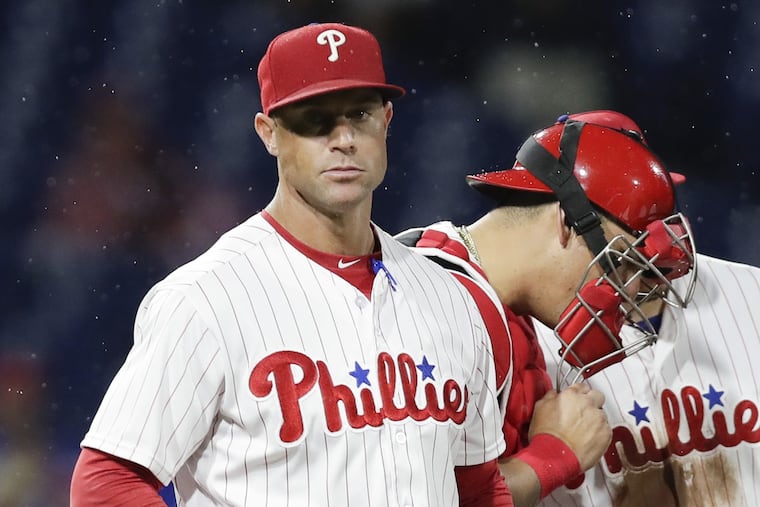The Phillies were progressive, but did they progress? | Bob Ford
The Phillies could not hold up at the end of the season.

Gabe Kapler, who is about to complete his rookie year as a major-league manager, has proved during this up-then-down Phillies season to be a master of relentless optimism and encouragement in the face of events that didn't always lend themselves to those.
Whatever else you think of Kapler, give him that much. The Phillies could go out and have one of their signature ugly games – kicking the ball around, not making much contact at the plate, and pitching inconsistently – and Kapler would say the team "presented itself" well, or that he saw a lot of "good teammate behavior." As nearly as one can tell, he not only said this stuff, but believed it, too.
In the old days of the Phillies franchise – which is to say all the days between 1883 and Kapler's hiring – the managers usually offered more dour assessments of poorly played games. Jim Fregosi, for instance, would frequently liken his team's performance to objects commonly found on the ground in a horse pasture.
If one were to say, "Sure, Jim, but how do you think the team presented itself?" that would have elicited an interesting response as well.
It wasn't that Kapler didn't have reason to display his default upbeat nature. A team that was 66-96 a year ago played the first four months of this season at 15 games over .500. The Phillies didn't catch the ball competently, and played tedious boom-or-bust offensive ball, but they won games, and that gave the manager license to keep using his unorthodox methods and preach the sermon of unlimited possibility.
Even when the season fell around their ears, and the Phillies went into Atlanta last weekend probably needing a four-game sweep to maintain any hope, Kapler said the team would keep grinding and battling as long as it had "a chip and a chair." As with most of what he said this season, it was a great line without much to back it up.
Sweeping any team on the road, let alone the division leader, would require the Phils to draw the equivalent of four straight full houses, and Kapler knew that by now. As it turned out, they didn't win a single pot and folded the season by being swept.
Heading into Monday night's 10-1 loss to Colorado, the Phillies were on their way to finishing 15 or more games over .500 at home and 15 or more games under .500 on the road for the first time since 1955. That's the sign of a fragile team, and perhaps not one able to handle Kapler's frenetic style over the course of a full season.
Baseball players are creatures of habit and they like to know what to expect when they come to the ballpark. Every day was funhouse day with Kapler. Fielders were used out of position. Pitchers entered and departed the games like ants on the march. Defensive positioning was shifted constantly. (How did it work? According to FanGraphs, the Phillies are minus-129 for Defensive Runs Saved, the worst mark since the stat began being kept 15 years ago.) Batting orders became randomized, often without identifiable reason.
One of Kapler's most interesting moves came recently when he pinch-hit for Scott Kingery in the second inning of a game. It would have been Kingery's first at-bat, but the bases were loaded and Kapler pulled him. After explaining his decision after the game, Kapler followed up by sending a text message the next day at 8:43 a.m. to all the Phillies regular beat writers.
"I believe strongly that experience comes in all shapes and sizes," Kapler wrote, in part. "Plenty of players can perform when conditions are easy. Do you want to be comfortable? Sure. Do you want to be comfortable more than you want to win baseball games for your teammates, your clubhouse and your fans?"
"When we begin seeking those same tactical advantages in 2019, they will no longer be 'different' or 'unusual.' That will just be 'us' and how we operate. Ultimately, these guys are experiencing a Phillies-first atmosphere instead of one optimized for individual comfort. That, in my opinion, is development."
Well, it's one way to look at playing baseball, and we don't have a catalog of Fregosi's texts from his term with which to compare. To be honest, he wasn't all that keen on the need to explain his moves.
But it has always seemed that players in any sport perform better when they are put in comfortable positions. After Carson Wentz injured his knee last season, Doug Pederson handed the playbook to Nick Foles and said, "Which ones do you like?" And those were the ones Foles was asked to execute.
Kapler believes that experiencing discomfort is even more beneficial, and that a familiarity with chaos will eventually pay dividends. If he's right, then the last seven weeks have been nothing but wonderful for the Phillies.
Get insights on the Phillies delivered straight to your inbox with Extra Innings, our newsletter for Phillies fans by Matt Breen, Bob Brookover and Scott Lauber. Click here to sign up.